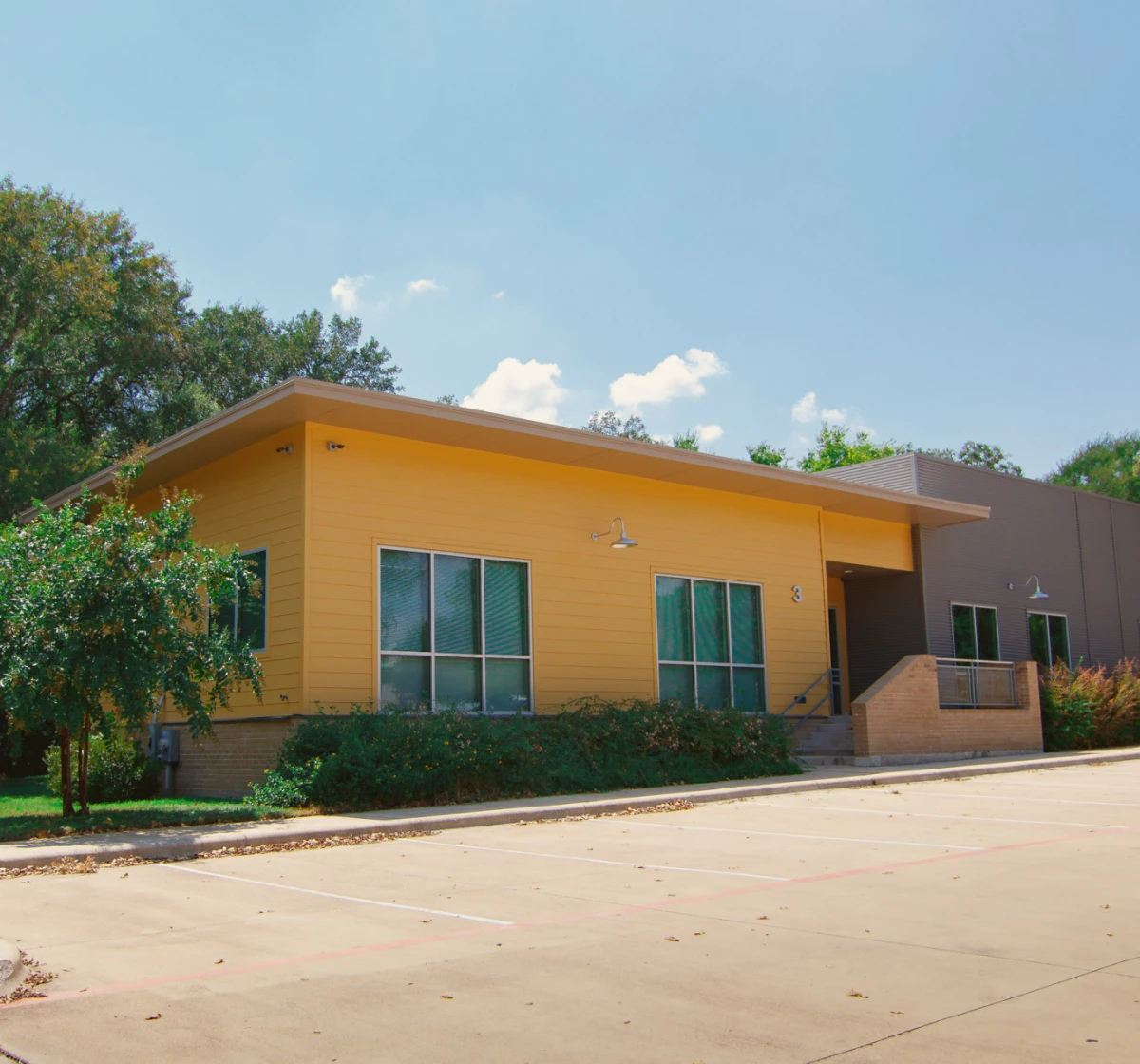We work with insurances. Verify yours now
Evidence-Based Care for Substance Abuse and Dual Diagnosis Issues
When it comes to starting your recovery process, dialectical behavioral therapy (DBT) for addiction at The Last Resort will help you to gain a new perspective on your struggles with drug and alcohol abuse, along with several other evidence-based and holistic therapies at our 55-acre campus in Austin, TX.
Discover your true potential within a caring community of clinicians and others in recovery at The Last Resort with DBT for substance use.


DBT is an evidence-based, therapeutic approach originally developed to treat borderline personality disorder.[1] Over the years, it has since been adapted successfully for various other mental and behavioral health conditions, including eating disorders, substance use disorders, and addiction.[2]
DBT for addiction integrates principles of cognitive-behavioral therapy (CBT) with mindfulness practices, emphasizing acceptance and change.
Dialectical behavioral therapy for substance use disorders emphasizes skills training to empower people with addiction to manage cravings, regulate emotions, and navigate interpersonal challenges more effectively.[3] By incorporating mindfulness practices, you learn to observe and accept your thoughts and feelings without judgment – an important step in breaking the cycle of addiction. The dialectical approach encourages you to balance acceptance of your current circumstances with active efforts toward positive change. DBT is led by a licensed clinician (psychiatrist, psychologist, counselor, or addiction specialist) and can also be adapted to individual or group therapy settings.


At The Last Resort, DBT for addiction takes a personalized approach to your unique circumstances. Our programs integrate DBT principles with a supportive environment that encourages growth and accountability for men and their families.
Our clients not only learn practical skills to manage addiction but also benefit from a holistic treatment approach that addresses underlying emotional and relational challenges. This comprehensive approach ensures that you have the tools you need to set a new foundation for positive change and achieve a sustainable recovery.
DBT for addiction addresses both the emotional and behavioral aspects that contribute to substance use and dependence in several ways:[4]
DBT teaches individuals specific skills to enhance their ability to cope with distressing emotions and manage interpersonal relationships effectively. These skills include mindfulness (being present at the moment without judgment), emotion regulation (understanding and managing emotions), interpersonal effectiveness (assertiveness and relationship skills), and distress tolerance (coping with crises without making the situation worse).
DBT incorporates behavioral techniques to identify and modify patterns of behavior that contribute to addiction. This includes identifying triggers for substance use, developing alternative coping strategies, and increasing motivation for change.
DBT employs a dialectical approach that balances acceptance and change. Clients learn to accept themselves and their current circumstances while working towards behavioral changes and improving their quality of life. This approach helps individuals reduce the intensity of emotional reactions that may lead to substance use and build healthier coping mechanisms.
DBT for substance use treatment typically involves both individual therapy sessions and group skills training sessions. In individual therapy, clients work with a therapist to address personal issues and develop personalized treatment goals. Group skills training sessions provide opportunities to learn and practice DBT skills in a supportive environment with peers facing similar challenges.
DBT for addiction is often integrated with other therapeutic approaches, such as pharmacotherapy (medications for substance use disorders), motivational interviewing (enhancing motivation for change), and relapse prevention strategies. This comprehensive approach addresses multiple facets of addiction and promotes long-term recovery.

DBT has demonstrated significant effectiveness in several studies for treating addiction, particularly among those with co-occurring disorders.[5] Multiple randomized clinical trials have shown that DBT reduces substance abuse in patients initially diagnosed with borderline personality disorder, and DBT has shown promise for people with severe co-occurring disorders or those who have not responded well to other evidence-based substance use disorder therapies as well.[6]
Research findings also indicate positive outcomes from DBT interventions for those struggling with drug and alcohol use. Post-treatment assessments and follow-up evaluations consistently show improvements in substance use behaviors and overall mental health.[7] DBT’s integration of mindfulness, emotion regulation, and behavioral strategies equips people with the skills needed to manage cravings, cope with emotional challenges, and enhance interpersonal relationships, enhancing short- and long-term recovery.
Engaging in dialectical behavior therapy for addiction involves participating in structured sessions focused on developing essential skills. These sessions cover mindfulness, distress tolerance, emotion regulation, and interpersonal effectiveness. Each skill area is designed to empower you to manage cravings, navigate emotional challenges, and improve your relationships with family and friends.


DBT for addiction includes both individual therapy and group skills training sessions. In individual therapy, you’ll work closely with a therapist to personalize your treatment plan, address personal challenges, and receive guidance on applying DBT skills to your daily life. Group therapy sessions provide a supportive environment where you’ll learn from peers, practice new skills, and discuss real-world applications under the guidance of skilled facilitators.
Navigating DBT as part of substance abuse treatment, learning emotional regulation and coping skills, and addressing underlying mental health conditions can be challenging. It requires a commitment to learning and implementing new behavioral skills every day.
Treatment programs at The Last Resort are specifically designed to support men through every phase of their recovery journey. We provide a comprehensive spectrum of care that integrates DBT principles at every level into your personalized treatment plan. Our program ensures that you’ll receive tailored support every step of the way.
With a commitment to holistic care and a supportive environment, DBT at The Last Resort will help you cultivate skills for sustained sobriety and enhanced well-being. We’re here to support you in achieving your goals for a healthier, substance-free life.
Yes, DBT can be effective even if other forms of therapy have not been successful. DBT’s structured approach, emphasis on skills training, and focus on acceptance and change can offer new strategies and perspectives that may resonate more effectively with individuals who have struggled with other therapies.
DBT focuses on interpersonal effectiveness skills to improve interpersonal relationships during addiction treatment. These skills teach individuals to communicate assertively, set boundaries, and constructively navigate conflicts. By learning to identify and express their needs effectively, clients can build healthier relationships and reduce reliance on substances or addictive behaviors to manage interpersonal challenges.
Additionally, DBT encourages clients to develop empathy and understanding for others, fostering more positive and supportive interactions in their social networks. The therapeutic environment of DBT also provides opportunities for practicing these skills in a safe and supportive setting, reinforcing new behaviors and promoting lasting improvements in interpersonal relationships.
Yes, DBT is suitable for adolescents and young adults struggling with addiction. Specific adaptations of DBT are designed for younger populations, emphasizing developmental considerations and engaging family members or caregivers in the treatment process. DBT’s focus on skill-building can be particularly beneficial for younger people navigating addiction challenges.
Progress in DBT for addiction recovery can be measured in several ways, such as increased use of skills in managing cravings and stress, improved emotional regulation, enhanced interpersonal relationships, decreased frequency of substance use or addictive behaviors, and better overall quality of life. Therapists may also use structured assessments, self-monitoring tools, and client feedback to track progress.
Yes, DBT for addiction recovery typically sets specific goals and milestones tailored to each person’s needs and treatment plan. These may include learning and applying specific DBT skills, reducing substance use or addictive behaviors, improving emotional stability, enhancing interpersonal effectiveness, and achieving a sustainable recovery that supports long-term well-being
[1] Cleveland Clinic. (2022, April 19). Dialectical Behavior Therapy (DBT). Cleveland Clinic. https://my.clevelandclinic.org/health/treatments/22838-dialectical-behavior-therapy-dbt on June 19, 2024
[2] Chapman, A. L. (2006). Dialectical behavior therapy: Current indications and unique elements. Psychiatry (Edgmont), 3(9), 62–68. https://www.ncbi.nlm.nih.gov/pmc/articles/PMC2963469/ on June 19, 2024
[3] Blackford, J. U., & Love, R. (2011). Dialectical Behavior Therapy Group Skills Training in a Community Mental Health Setting: A Pilot Study. International Journal of Group Psychotherapy, 61(4), 645–657. https://doi.org/10.1521/ijgp.2011.61.4.645 on June 19, 2024
[4] Corliss, J. (2024, January 22). Dialectical behavior therapy: What is it and who can it help? Harvard Health. https://www.health.harvard.edu/blog/dialectical-behavior-therapy-what-is-it-and-who-can-it-help-202401223009 on June 19, 2024
[5] Dimeff, L. A., & Linehan, M. M. (2008). Dialectical Behavior Therapy for Substance Abusers. Addiction Science & Clinical Practice, 4(2), 39–47. https://www.ncbi.nlm.nih.gov/pmc/articles/PMC2797106/ on June 19, 2024
[6] Flynn, D., Joyce, M., Spillane, A., Wrigley, C., Corcoran, P., Hayes, A., Flynn, M., Wyse, D., Corkery, B., & Mooney, B. (2019). Does an adapted Dialectical Behaviour Therapy skills training programme result in positive outcomes for participants with a dual diagnosis? A mixed methods study. Addiction Science & Clinical Practice, 14(1). https://doi.org/10.1186/s13722-019-0156-2 on June 19, 2024
[7] Haktanir, A., & Callender, K. A. (2020). Meta-Analysis of Dialectical Behavior Therapy (DBT) for Treating Substance Use. Research on Education and Psychology, 4(Special Issue), 74–87. https://dergipark.org.tr/en/pub/rep/issue/54042/714846 on June 19, 2024
Our admission specialists are ready to talk with you 24/7 about starting the journey. We always treat each caller with the utmost respect, detailing your treatment options and respecting your confidentiality.
Based on your assessment, we’ll work together to create a customized treatment plan that addresses your needs, ensuring you have the support and resources necessary to achieve your goals.
The Last Resort is in-network with most major insurance companies. Fill out the form below to verify your healthcare coverage within the hour.
We’ll welcome you to our campus and start laying the groundwork for a successful, long-term recovery.